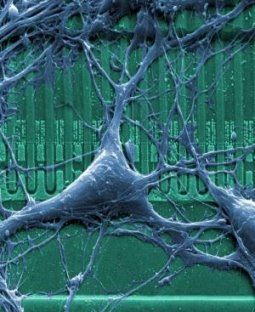
What do you get when you cross brain cells with a microprocessor? Largely ignored—European researchers have created an interface between mammalian brain cell (neurons) and silicon chips. Think of organic computers or neural prostheses for certain brain lesions. Since the research was done in Europe, part of the European Union's Information Society Technologies program, it has been largely ignored on this side of The Water. Had they done this at M.I.T., it would have made the Times. It's called the NACHIP project, and it crosses the barrier between living creatures and machines.
As the report in IST Results points out [click headline], those potential benefits are years or decades away and would fit into the some-day-man-will-mine-the-ocean-floor school of science writing. But there is a potential short term result: the use of neuron-silicon chips to test the effect of new pharmaceuticals on neurons.
And how they did this little stunt is amazing.
A German microchip company, Infineon, placed 16,384 transistors and hundreds of capacitors on a chip 1 mm square. Then the researchers took rat brain neurons and using special proteins, glued the neurons to the chip. The proteins did more than just glue the neurons; they acted as an interface so electric signals could pass from the neurons to the transistors and back again using ionic channels. The transistors can record the signals, and the capacitors can pass signals to the neurons. They tested it by stimulating the neurons and seeing which ones fired. The most pressing problem now, however, is g
 etting that to happen without frying the neurons, which is what they are working on. The researchers are now preparing a proposal to communicate with the neurons using genes. Isaac Asimov would approve. So might Mary Shelly.
etting that to happen without frying the neurons, which is what they are working on. The researchers are now preparing a proposal to communicate with the neurons using genes. Isaac Asimov would approve. So might Mary Shelly.The work is being done at the University of Padua in Italy, the Max-Plank-Institute for Biochemistry in Germany, and the University of Zurich in Switzerland.
[And a hearty thank you to faithful reader CW, who worries that the whole thing is more likely to produce Frankenstein than Steve Austin, and a good point that is too.]
No comments:
Post a Comment